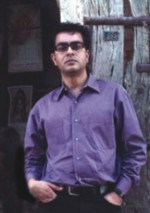Book Review
Not Everyone is Innocent

Evidence of Suspicion
(A Writer's report on the war on terror)
Amitava Kumar
Picador India
Price: INR 350 |
Abdullah Khan
Terrorism, according to the Oxford Advanced Learner's Dictionary, is the use of violence for political aims or to force a government to act, especially because of the fear it causes among people. What if a democratic government itself indulges in an act of violence against its own citizenry or people elsewhere as the means to some sort of imagined noble end? Is it still called Terrorism, or will we invent some fancy term like war against terror to cloak the immorality of the act?
Another question: how justified is a state to incite or instigate a citizen to commit a crime, when it suspects that person is likely to commit some crime in the future, and then punish him or her for a crime he or she never committed? Is it not in the penal code of every country that an abettor of crime should be treated on a par with the actual perpetuator of that crime? Then what is the status of the state?
Amitava Kumar's intriguingly titled book Evidence of Suspicion raises many more such questions, telling us how in this post 9/11 world, the liberal democratic states, from the USA to India, have become so paranoid while dealing with terrorism that their wars on terror have destroyed as many innocent lives, if not more, as terrorism has done. The book cites many examples where individuals were victims of state brutality in the name of fighting the scourge of extremism.
The most interesting, and strange too, is the story of Hemant Lakhani, a failed cloth salesman from London who was convicted of selling a missile to an FBI informant in USA. Lakhani was actually approached by the FBI informant who pretended to be an Islamic terrorist, to buy missiles. Though boastful of his connections with Ukrainian arms sellers, Lakhani was not able to procure any missiles. Ironically, the FBI itself had to manage missiles for Lakhani so that he could sell them to its informant.

Amitava Kumar |
Of course, Lakhani was not an innocent in absolute terms, but still he had not committed any crime. And the law of natural justice suggests you can't punish somebody before he commits a crime.
Back home, Professor Kumar tells us about Iqbal Haspatel of Mumbai, who was incarcerated and tortured for days by police for possessing a missile. Later, it was discovered that the alleged missile was nothing but a part of some textile machinery. For the ignorance of the government officials, an innocent person had to suffer. Another classic example of ruthless and irresponsible behaviour of state machinery is the case of SAR Geelani. After the terrorist attack on Indian Parliament, police arrested Geelani and tortured him for months before he was finally acquitted. His detention was based on disputable evidence. Had he not been a Muslim, not a Kashmiri, not a professor of Arabic, the kind of evidence police had, might not have been enough for his arrest. But, unfortunately, he was all three. In the jaundiced eyes of the police, Geelani's religious, ethnic and professional identities made him perfectly qualified for being a 'terrorist'. To be precise, his arrest was based more on the preconceived notions of law enforcing agencies about a particular religious and ethnic group than solid evidence.
The book is part reportage, part philosophy, part protest, as the back cover informs us. Full of sublime narratives and subtle descriptions, it is a thoroughly fantastic book. The best thing about Kumar's writing is that seldom does he allow his personal prejudices to creep into the text. He acts more like a cameraman of a documentary film showing you a plethora of images. He also knows what to focus on, and when to zoom in or out. Then he leaves you free to reach your own conclusions. Like his earlier book Husband of a Fanatic, it is a must buy. And, of course, a must read too.
opyright
(R) thedailystar.net 2010
|
| |
